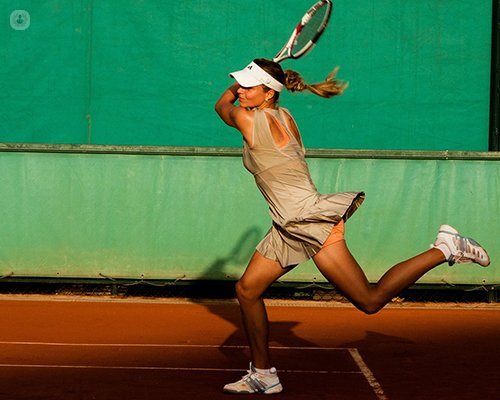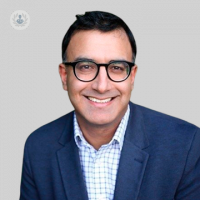Tennis elbow: what are the symptoms, causes and treatments?
Written by:You don’t have to play tennis to get this painful condition of the elbow. The condition, known medically as lateral epicondylitis, is caused by the repetitive and strenuous overuse of the muscles and tendons of the forearm near the elbow. In this article below, esteemed consultant orthopaedic surgeon, Mr Shahid Punwar, provides all the important nuggest of information regarding the condition.

What are the symptoms of tennis elbow?
Sufferers of tennis elbow will experience pain focused around the outside of the elbow, where the forearm meets the elbow. You may feel pain when lifting, bending or extending your arm, when holding small objects such as pens, when shaking hands and when opening doors.
You may experience slowly increasing pain, or the pain may develop suddenly. The pain is often made worse by moving the wrist with force, such as when opening a jar, or using a toothbrush.
What are the causes of tennis elbow?
The pain is related to microscopic tears that develop in the tendons in your arm, from overuse or repetitive motion. The elbow joint is surrounded by muscles, and the tendons in the elbow join the muscles to the bones. If the muscles and tendons become strained, small tears can develop and the tendons and muscles can become inflamed and sore.
Any activities that apply repetitive stress to the elbow joint can cause the condition, and as the name suggests, this can be from playing tennis, although this is not the most common cause.
If you do any kind of repetitive movement of the elbow, such as painting, sawing or playing violin you may be susceptible to tennis elbow. Prolonged periods of computer and mouse use are frequently the cause.
How is tennis elbow treated?
Tennis elbow will eventually get better without treatment, as the inflammation will eventually reduce and the small tears will heal, however a visit to your consultant orthopaedic surgeon can help to improve your symptoms and recovery time.
Treatment options include:
- Rest: resting the elbow will allow it to heal quicker.
- Using a cold compress against the elbow for a few minutes, several times a day can help speed up recovery time.
- Using a strap or brace around the forearm may help to relieve the stress on the tendon.
- Exercises to strengthen and stretch the muscles as well as massage to release any tightness can be done by physiotherapists.
- Steroid (cortisone) injections can be administered by your orthopaedic surgeon to help relieve the pain and reduce swelling. Sometimes it is necessary to have more than one injection, or even an injection of your own blood.
- If there has been no improvement, it may be necessary to have surgery to remove or repair the damaged tendon.
If you are experiencing tennis elbow, or want to diagnose your elbow pain, make an appointment with Mr Shahid Punwar via his Top Doctors profile today.


